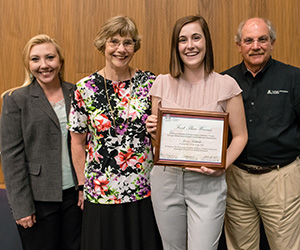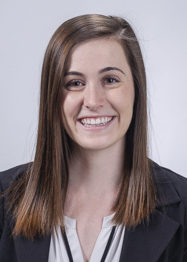Jenna Koblinski submitted this piece to the University of Arizona College of Medicine – Phoenix’s annual Narrative Medicine Program competition open to all first-year medical students. She was awarded the Student Growth and Self-Reflection Writing Award for this piece. Read more here: https://phoenixmed.arizona.edu/about/news/essay-vulnerabilities-wins-writing-award

From left to right: Dr. Jennifer Hartmark-Hill, Dr. Elaine Niggeman, Jenna Koblinski, Dr. David Beyda
Slight panic was stuck in my throat as I thought of the day and the numerous charts shown by the learning specialists. They were medical school “report cards” from previous students that I too would one day receive. Colors were bad. Red, my favorite color, meant they had failed the block; orange meant passed with a retake; yellow meant passed, but with a score that did not correlate well with STEP. Red, orange and yellow kept flashing through my mind like the one sunset I did not want to see. I can’t even remember if they had shown us any student charts without these colors. This was all intimidating, but what had spoken to me most was hearing people say that what worked in undergrad would not work here and that undergrad success did not equate to medical school success. I felt as though I would fall into that group of students. As someone who has wanted to be a physician her whole life, I did not know what I would do if I could not succeed in medical school.
After a good night’s rest, I was able to calm down and build myself back up. Being able to talk to second years helped, as they reassured my class that we would be okay. My excitement about medical school was again allowed to be my main focus. This was only increased by finding out that when we were shadowing third and fourth years on rotation I would be seeing a surgery. I could not wait to finally be in an operating room as an actual medical student. Although I had to be there at 4:30 am, this was a trade-off I would easily make.
I consider myself a “middle-of-the-day person,” but that morning you would have thought I was a natural early riser. I was out of bed as easily as if I had a day at Disneyland ahead of me. Realizing I was ready too quickly, I forced myself to sit on my bed for ten minutes; I did not want the third year to think I was too eager. I finally began my short drive to Banner Hospital. The sky was black, as the sun was still hours from rising. Dancing and singing along to “Shape of You” by Ed Sheeran, I felt so excited for the day in front of me—so carefree. My car was almost out of the way when I realized the black SUV speeding down the road perpendicular to mine was not going to stop at their respective stop sign. I tried to speed-up myself and pounded on my horn as hard as I could to try to alert them I was there (and had no stop sign of my own). However, this was hopeless and the car crashed hard into the back right side of my poor Elantra spinning me around 180 degrees (to the point where the police initially thought I had been heading back from the hospital and not to it). By the time I could get out of my car, the SUV was long gone. I was able to make out a sole Cardinals decal, but not even one license plate number.
Because I fortunately was unhurt, it took quite a while for the police to arrive. During this time I had plenty to think about. My mind began racing—almost as fast as that car’s speed—and although I would not consider myself a superstitious person, how could this not be an omen? My first time visiting a hospital in medical school and not only am I hit by a car, the driver doesn’t even stop to check on me or exchange insurance? Worrying this was going to set the tone for the rest of my first year, I finally was able to talk to the police. They stated there was nothing they could do. I felt defeated. I checked in with the school and they gave me the option to call it a day. At that time, however, a resolve came over me and I thought, “I’ll be damned if I let this stop my surgery experience.”
Taking it easy on my car in its poor, dented condition, I made it to the hospital. I met with the third year and after seeing the end of rounds, headed to the operating room. I had shadowed colorectal surgeries in undergrad, but this was a thyroidectomy—uncharted territory. The third year went to talk to someone and with a huge grin on his face told me, “We’re scrubbing in.” I was in shock. The most I knew about scrubbing in was how to help someone else pull their tag off their gown—and that you had to walk with your elbows bent and hands up in the air. I mimicked the third year’s technique as we scrubbed down our fingers and scooped our hands under the water—making sure to avoid water dripping from our elbows back to our hands.
In the OR I was able to actually stand right against the patient and see everything first- hand. The car accident at this point was not even a flutter in my mind. I was amazed I was getting to experience this life opportunity at all, especially as just a second-week medical student. The surgeon was remarkable, both at her work and how she taught her residents and students. As someone who knew nothing about the thyroid, she explained everything to me, only enamoring me more with what I was privileged to witness. Near the end of the surgery she called me over and said, “put your finger here,” pointing to the patient’s neck. Clearly this was a joke, so I didn’t move. It was not until I saw the third year give me a nod in that direction that I realized this was no joke. I came over and she took my hand and placed it over a smooth, pulsating tube. “That’s the common carotid artery,” she said casually as if it weren’t my first time placing my hands on someone’s internal anatomy. In reality, I must not have stayed there for very long, but to me the only indication that time hadn’t completely stopped was the constant rhythm of the patient’s blood moving through the vessel. I was amazed—what an experience! I was overcome with gratitude for the patient, the surgeon and the medical student for affording
me such an opportunity. Medicine was truly the path for me. In that moment a car crash seemed so negligible.
After that experience, medical school really took full effect. While I definitely struggled, I loved it and felt I could do it. If there was a difficult week, I could turn to an endless supply of resources for help. My clinical knowledge and skills were growing. Doctoring and my Community Clinical Experience (CCE) may have felt uncomfortable or awkward at times, but throughout the year I had changed so much and actually felt confident talking to patients alone. My first doctoring video could now just be a cringeworthy joke to watch rather than the reality of my capabilities. While I knew I still had a very long way to go in all aspects of my medical school training and was far from a person who did not make mistakes, I felt I was on the right path and had the tools necessary at hand.
The year had its ups and downs, but to me truly culminated in my last CCE session of first year. The day went the same as every other CCE: I talked to patients by myself, returned to my preceptor and delivered my oral presentation. However, there was a lull at the end of the day where my preceptor sent me to shadow a resident with a patient for my last encounter. I was not given any background on this patient, all I knew was that she was Spanish speaking and her daughter was with her.
The chief complaint became clear that the patient was out of her opioids and wanted a prescription refill. I (shamefully) immediately thought about the opioid epidemic and all of the talks where we were told that physicians need to prescribe them less. To me, they did not seem appropriate. Why not any of the alternatives we were taught? This colored the encounter with a slight judgment.
It was not until the resident told her that her already massive osteosarcoma had grown in size and was now compressing her nerves even further that I felt the color drain from my face. This woman was in pain. Real pain. Emotional and physical pain. Pain that I had luckily never known. I immediately felt overcome with guilt about the hypercritical thoughts that flitted through my mind. I thought learning that opioids do serve a very real, necessary purpose when prescribed correctly was going to be my lesson of the day.
Standing up and sitting down, shifting her weight from the cancerous leg to the other, it was apparent this woman was in pain, but she was one of the nicest patients I had ever encountered. She was answering every question so positively—her appetite was fine, she was doing well, she was happy. At these responses, her concerned daughter in the corner burst into tears announcing that her mother was lying to the resident—she was not fine, not even a little. This was all very overwhelming for me, but the resident remained calm, cool, collected and above all, empathetic. The resident refilled the medications and told the patient she was about to move to another state to become an attending. It was only at this news—not her worsening prognosis—that the patient herself began to cry and hug the resident goodbye. A real goodbye. A forever goodbye. We left the room and only after exiting did I see tears well-up in the resident’s eyes.
We discussed the encounter with the attending and, as was standard after the last clinic patient of the morning, the attending and resident went to lunch and I went home. Leaving my last day of CCE, I realized I had so much more to learn. I had little experience in knowing how to react in those situations or how to treat a patient when a cure is no longer an option. Driving home, I suddenly had the compelling urge to shower. It doesn’t count as crying if you’re in the shower.
Jenna Koblinski is a member of The University of Arizona College of Medicine – Phoenix, Class of 2021. She graduated from The University of Arizona in 2017 with a Bachelor of Science in physiology and a psychology minor. She is an aspiring dermatologist. In her free time she loves to dance, socialize, and watch anything and everything on Netflix.


